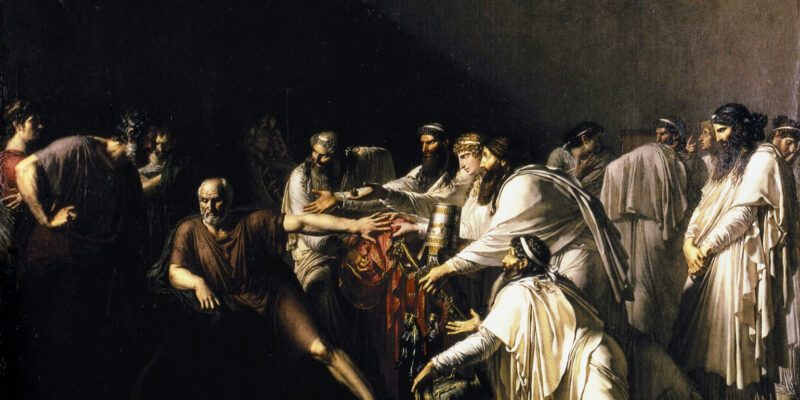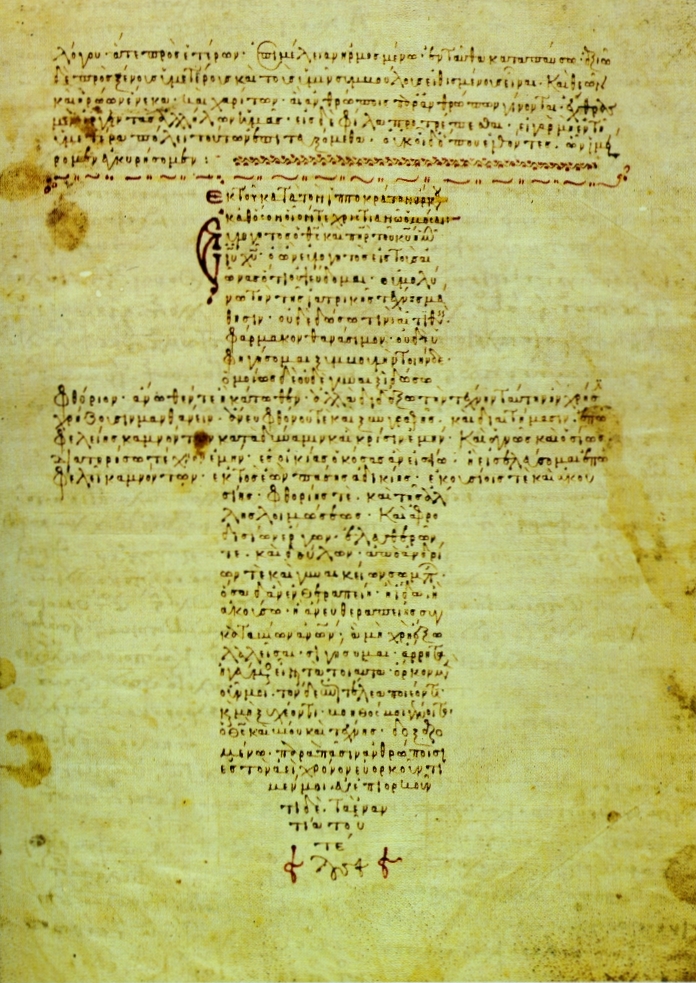
Hippocrates, Father of Medicine (Kos, 460 BC – Larissa, 377 BC), known as the «Hippocrates the Great» according to Aristotle, was an ancient Greek physician, one of the most prominent figures in medicine. He was a pioneer and pillar of medical science and is considered worldwide as the father of modern medicine and the founder of the Hippocratic School of Medicine (known around the world as Unani Medicine). He is the founder of rational medicine who managed to rid it of its then painful and metaphysical elements, such as preconceptions, prejudices, demonologies and superstitions. Hippocrates was credited by Pythagorean students for linking philosophy to medicine.
Hippocratic medicine is the harmonious combination of anthropocentric science with medical art and philosophical thinking. It identifies professional practice with ethical principles and humanistic values. Hippocrates is also largely credited for the promotion of systematic study and clinical medicine. His medical knowledge, prescribing practices and advice to doctors are summarized in 59 early ancient Greek medical works called the «Hippocratic Collection» or «Corpus Hippocraticum» and his other works.
Biography
Hippocrates was born in Kos in 460 BC. and belonged to the branch of Asclepius healers. His father, Heraclides, was a physician and descendant of Asclepius, God of medicine, while his mother Finareti was a descendant of Hercules, the Greek mythology hero. He was gifted with great diligence and a drive for learning and studied medicine at the famous Asklepieion of Kos. Initially, he was a student of his father and later of many others.

Painting of the story of Hippocrates refusing the presents of the Achaemenid Emperor Artaxerxes, who was asking for his services. Painted by Girodet.
After his studies, he began to practice medicine on the island of Kos. In his day, other doctors were immersed in ignorance and prejudice. He considered it his duty to travel to other places to complete his education and to spread his beliefs about being in the fresh air, water and sun. He made scientific trips to many areas and his fame quickly spread throughout Greece, reaching as far as Persia. It is rumored that Artaxerxes II, King of Kings of the Persian Achaemenid Empire from 404 BC until his death in 358 BC, invited him to his court by sending ambassadors with valuable gifts, but he refused to go because he did not want to leave his homeland.
He helped the citizens of Argos and Athens to take precautionary measures against the spread of infectious diseases. The Athenians, as a sign of their gratitude for his help in the particularly deadly plague of Athens, initiated him into the Eleusinian mysteries while declaring him a citizen of Athens. After his travels, he ended up in Thessaly, the land of his ancestors, where he remained until the end of his life. He died in Larissa in 377 BC, at the age of 83.
The Hippocratic essays
During his travels, Hippocrates healed and taught, writing his observations, theories, discoveries and ideals in the Ionian dialect. His works are products of excellent observation, experience and rare rationality. The recording of his medical experience became the foundation on which modern medicine was built upon. After his death, his works were collected in the «Hippocratic Collection», as mentioned above.
The Hippocratic Theory
The Hippocratic theory believes that everything comes from the 4 elements of cold, dry, hot and wet. The element of earth predominates in the solid components of the body, while in liquids water is predominant. The essence of everything that unites is the spirit that resides in the heart and is an innate and warm element in man.
Hippocrates’ methodology is based on three fundamental principles: clinical observation, rationality and experience or akoria, meaning not reaching saturation. It is also based on the triadic nosological principle which distinguishes the patient from the disease and the doctor.
In the body, there is a special animal force, physis or nature. On this power depends the maintenance, development, but also the treatment of the body and its return from a pathological state to normal. Therefore, Hippocrates believed that rest was of greatest value and importance for a person.
According to Hippocratic theory, the body contains four humors: blood, phlegm, yellow and black bile. The balance of the humoral ratio maintains the «eukrasia» (health) of the body, while the «dyskrasia» (disorder or imbalance) causes diseases. The correct ratio of humors, i.e., their balance, is characterized by the term «krasis», the body’s ability to have a strong constitution.
The humor theory is based on the fact that our body humors mix or shift in different ways when we have health than when there’s a disease. Human health is at homeostasis when the humors are mixed in a normal way while disease happens when there’s an imbalance in the humoral mix.
The 4 Temperaments

The four humors of Hippocrates and their elements
According to Hippocrates, the dominance of a humor affects our image, appearance and behavior. So, when a humor prevails, it becomes the dominant temperament or personality of that humor. Of course, people have a mixed temperament with the second, third and fourth humors being less and less dominant up to negligible.
The central idea of humors-temperaments is:
- The blood humor creates the hematic or sanguine personality who is carefree, optimistic, cheerful, enthusiastic, inspiring and larger than life on the positive side and irresponsible, superficial, gregarious, absent-minded, unreliable and mythomaniac on the negative.
- The humor of yellow bile creates the choleric personality that is leading, explosive, energetic, agile, persistent, powerful, unstoppable on the positive side and tyrannical, irritable, obsessive, materialistic, selfish and insidious on the negative.
- The humor of black bile creates the melancholic temperament who is analytical, introverted, creative, altruistic, wise on the positive side and procrastinating, closed, absent, insecure, hypersensitive, silent, sullen, cynical on the negative.
- The humor of phlegm creates the phlegmatic temperament that is calm, steady, unifying, submissive, sweet and devoted on the positive side and unmovable, slow, boring, cumbersome, stubborn, naive, unguardedly giving and victimized and on the negative.
To make the right analysis of the individual temperaments, an analysis of their habits and reactions to situations is a good start for amateurs. For professionals who can analyze the tongue, irises, body type and medical history they will be able to reach an accurate diagnosis of the pathology of each temperament.
Food Elements
All foods have dual characteristics, one from each group of dry-wet and hot-cold. Each type of food, whether it is an herb, spice, protein, dairy, etc., has a different elemental action within the body. This action changes according to how the foods are cooked and eaten, in other words, whether they are raw or cooked, served cold or hot, are dry or wet and soup-like. Hippocrates, using the elemental actions of foods and herbs in combination with physical activity and rest, to primarily cure the imbalance of bodily humors and thus return the body to homeostasis, hence health.
Clinical Semiology
The «Hippocratic Collection» refers in detail to clinical semiology, i.e., the study and transfer of knowledge about the history and clinical examination of sick patients from all human body systems. Also, diagnostics, prevention and prognosis. The clinical signs, symptoms and some of the syndromes described in the Hippocratic texts, have since formed the basis for the clinical examination of patients.
According to Hippocrates, the clinical examination had to be thorough and repeated often, because diseases are not static, but evolving and in phases, whereas in these phases the outcome is predetermined. The patient diagnosis was performed in an exhaustive way, with criteria reminiscent of current clinical examinations.
Some of the Hippocratic clinical signs are the face, fingers and stethoscopy. Because the clinical diagnostic possibilities of the time were limited, Hippocrates focused mainly on the prevention and prognosis of clinical signs (anisocoria, sweating, edema).
In Hippocratic medicine, diseases are classified based on their symptoms. They are distinguished according to their clinical course, i.e., as acute and chronic or depending on their distribution into epidemic, endemic and sporadic. The terms «flare-up», «relapse», «analysis», «crisis», «frenzy», «climax» and «recovery» were also used.
Hippocratic Therapy
Hippocratic medicine flourished during the golden age of Pericles which was no accident or coincidence. The forerunners of Hippocrates, apart from Asclepius and his medical centers, were folk-traditional medicine and Ionian philosophy.
According to the Hippocratic belief system, healing is the intentional enhancement of the body’s healing power. In particular, that drugs should benefit or at least not harm, a core principle. In addition, Hippocrates was reluctant to prescribe drugs or specialized treatment that could prove wrong. Instead, he preferred generalized therapies. He was against polypharmacy (the use of multiple medications), something that is also certified by his phrase «many times the best medicine is no medicine». In some exceptional cases, however, he used powerful drugs.
Hippocratic Surgery
Medicine in the time of Hippocrates knew almost nothing about human anatomy and physiology, due to the Greek taboo that forbade the dismemberment of people. Hippocratic medicine, however, stood out for its rigorous professionalism, discipline, and rigorous practice and despite its limited anatomical knowledge did not lag behind in clinical nosology.
Of the surgical specialties, orthopedics was the most developed, while its teachings remain to this day, the subject of studies in pulmonary medicine and surgery. Hippocratic doctors performed skull perforations, chest and abdomen punctures, nephrotomies and amputations in cases of gangrene of the limbs and many other surgeries. Dentistry was performed in a wide range of issues and was very advanced.
Hippocratic Doctors
The Hippocratic physicians paid special attention to all aspects of their work such as the prognosis and other detailed specifications for the pre-and post-surgical practices concerning the patient, the area and the conditions of the medical office. That is, how natural and artificial light should be used, how the patient should be prepared and cared for, and how surgical and other surgical-related items should be sterilized. There were also specifications about the staff, patient posture and techniques to be followed in an operating room. Even their nails were kept to a certain length.
They were more effective in treating diseases than the rival Medical School of Cnidus, which paved the way for greater development in clinical practices. Therefore, the treatments provided to the sick by the Hippocratic doctors were done in very advanced ways for the time.
According to Hippocrates, the physician must reject any kind of superstition, be pure in body and inseparable from morality. To live a modest life full of silence and reflection, like a philosopher. That is, to act only with his spiritual power and to be led to the same truths or ideas, to which scientists today are led by the slow and arduous work of analysis and observation.
Hippocratic Oath

A 12th-century Byzantine manuscript of the Hippocratic Oath in the form of a cross
The «Hippocratic Oath» is an immortal classic text of just one page. It is the oath given by doctors and refers to the ethical practice of medicine they should adhere to. It is believed that the oath was written by Hippocrates himself in the 4th century BC. or by one of his students and so it is included in the «Hippocratic Collection». Although it is a document more of a historical and moral value now, the oath is considered a much revered «passing ceremony» for those who have been trained to practice medicine. However, but it is no longer mandatory and is not given by all physicians.
The Hippocratic Oath is in essence, the constitution of medical ethics and professional practices, on which almost all relevant global medical declarations have been based on. Such is the «Universal Declaration of Human Rights», Geneva 1948 and the World Medical Assembly «Declaration of Lisbon on the Rights of the Patients», 1981.
Positive Effects
The pioneering work of Hippocrates positively influenced not only general medicine, but all pathological and surgical specialties thereafter. It is also worth noting his predictive ability. Hippocrates extended his clinical observations to the patient’s family history and environment in his two treatises or summaries which are almost equivalent in the Hippocratic texts.
The first one «On air, water, places» deals with the concepts of the environment. It is a book for traveling practitioners, explaining all they have to check about the bad quality of these elements when they arrive in a new unknown place.
The second «On sacred disease» deals with heredity, declaring that one disease is no more sacred than any other, a fact that is admitted even by modern medical and biological research. In his second treatise, he refers to unhealthy living conditions, improper diet, dietary deviations and the destruction of the environment, a most threatening health problem even today.
The Contribution of Hippocratic Medicine
The contribution of Hippocratic Medicine to the world of medical science is considered invaluable worldwide. Its content is historical, philosophical, humanitarian as well as methodological. He freed medicine from the magical-religious misconceptions, quackery and superstitions of the time. He also rejected the then beliefs that the origin of diseases and epidemics is «God’s will». Hippocrates told them that their wounds were caused by polluted water, dirt, mice and the sick with whom the rest of society came in contact.
Although he separated medicine from philosophy, he did not neglect to attach importance to ethical values and philosophical thinking. He stressed the anthropocentric character of medicine, the fluidity of knowledge, the relevance of diagnoses and the limited medical possibilities.
The following quote summarizes the philosophy of Hippocrates: «Life is short, art is long, the weather is sharp, experience is wrong and the crisis is bad» meaning that Human life is short, science is endless, time is short, experience is wrong and the decision is full of responsibilities.» Human life on earth is fleeting and Hippocrates tried to make it more bearable. He struggled to relieve man from pain, illness and fear.
The worldwide recognition of Hippocrates as the «Father of rational medicine» is proof of the priceless value of his pioneering work, which greatly influenced the evolution of scientific medical thought in depth, from his time to the present day.
Xenia Ioannidou, Teacher of Alternative Therapies
Founder & Master Teacher of RealChange Academy®
Note: Text adapted in part from Wikipedia




